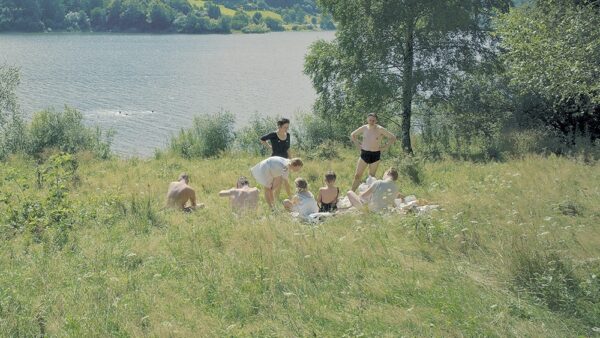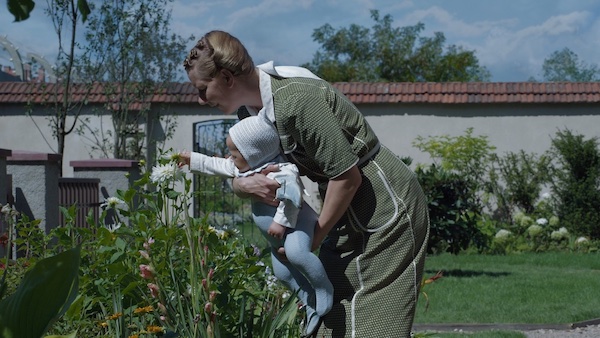New York Film Festival 2023: “The Zone of Interest” — An Essential Experience
By Erica Abeel
The Zone of Interest is a cinematic embodiment of Hannah Arendt’s famous phrase “the banality of evil.”

A scene from The Zone of Interest. Photo: A24
What is there to say? Indeed, the opening of The Zone of Interest says nothing. You get only a fiery, blank screen and tsunami of sound — discordant and unrelenting — a harrowing roar belched up from Hell. You sit. You wait. You wait a long time listening to that sound.
Open on an idyllic pastoral scene. A family, blond heads, a man in a 40s bathing suit picnicking beside a river. Birdsong. Is that a woodpecker? Look carefully, in the distance, a couple of people swimming in the river. The group packs up and heads homeward through a wooded path, some on horseback. Across the river is Auschwitz.
“Zone of Interest” was the Nazi term for the area surrounding the camp. English director Jonathan Glazer has adapted his film (winner of the Grand Prix at Cannes) from the novel by Martin Amis. Best known for Sexy Beast and Under the Skin, Glazer made Zone after an absence of 12 years. A high point of the New York Film Festival (presented by Film at Lincoln Center), Zone is mainly composed of scenes of family life. Rudolf Hoss (Christian Friedel) and family live in a stolid but comfortable, roomy house with extensive gardens that abut Auschwitz. Unlike the Amis novel, Glazer forgoes the standard elements of plot, as if refusing to honor this milieu with “relatable” people. In Zone there is no story proper, no love interest, no character arc — the sole “story” is the obliviousness of the characters to the hell around them.
Hoss, the paterfamilias, has a job as the Commandant of Auschwitz. His wife Hedwig (Sandra Huller) revels in their home, bosses the maids around, sees to the cooking, cleaning, child care. There’s a new baby. A daughter who walks in her sleep, propelled by some nightmare. There are horseback rides and birthday parties around a pool with a slide. The occasional jarring detail pops up in these seamless scenes of everyday life. Hedwig preens in front of the mirror in a confiscated fur coat. We hear the word “Jewess.” A diamond is discovered in the toothpaste — “They’re clever,” someone observes. One of the sons plays with his stash of gold teeth.
We register the atrocities through the occasional appearance of a prisoner/servant, but mainly through a muted soundscape (created by Johnny Burn) of barking guard dogs, screams, clanking, sporadic gunshots, the arrival of trains. And visual cues: a prison watchtower beyond the garden fence. The smoke — plumes of smoke, belching smoke.
At one point Hedwig tells her husband she wants to go to an Italian spa “for pampering.” Her mother comes to visit. They tour the extensive gardens. Hedwig says she’s growing thicker vines that will hide the barbed fence. Her mother responds, You’ve really landed on your feet. The mother, though, is bothered by the smoke — it worsens her cough. Early on there’s a meeting in a dimly lit room (no “movie” lighting here) with Nazi officials that follows Hoss discussing the specifics of an incinerator and how its chambers can be organized. “Burn, cool, unload, reload.”
In a bedroom scene Hedwig gets coyly seductive and giggles girlishly when Rudi calls her “Mutzi.” He calls her “the queen of Auschwitz.” A later scene catches him scrubbing himself in the basement after sex with a devastated woman who must be a prisoner.
A small blip of a plot involves the husband’s orders to relocate in order to supervise other concentration camps. Hedwig balks at leaving her dream house. She says, How can you do this to me? They work things out, as couples do. After all, Hoss is a rising star in the Nazi party.
Another quasi “event” that disrupts the family’s routine is the abrupt departure without warning of the mother. The cough, maybe. Although in one semi-hallucinatory scene she appears to perceive the inferno beyond the walls of the house. Briefly, another dimension of consciousness flickers across the screen.
In the film’s third act the camera shifts without transition to the post-Holocaust museum. All the shoes. Hoss was hanged for war crimes in 1947.
Zone is the exact opposite in spirit of the treacly violin theme song by John Williams in Steven Spielberg’s Schindler’s List. Glazer is not working a register of sentimentality, pathos, solace — he holds his camera steady on the imponderable. (His brilliant cinematographer is Lukasz Zal of Pawel Pawlikowki’s Ida). Glazer has stated in interviews that he had no wish to portray the individuals in Zone as monsters; far more uncomfortable, they’re portrayed as people. Fellow humans. Zone is a cinematic embodiment of Hannah Arendt’s famous phrase “the banality of evil.” There’s no unseemly voyeurism, no horror porn. Hoss is presented as just a preoccupied husband/father/functionary muddling through. In one indelible image that speaks volumes he’s seen taking a smoke outside his house, the smoke mingling with the plumes in the sky.

Sandra Hüller in a scene from The Zone of Interest. Photo: A24
As Hoss, Christian Friedel is a marvel. Actors continually amaze. At a presser in Cannes, this paragon of evil was an open faced, jolly dude, a master of his craft, wholly unrecognizable as the character. And as Hedwig there’s the formidable Sandra Hüller in an ugly housedress and hairdo, giggling at her husband’s terms of endearment. A cliché of film criticism is to call an actress fearless. It’s usually applied to women, as if they had more to fear than male actors, the assumption being, women don’t want to be disliked. In this role Hüller welcomes your loathing … Bring it on! As another of Hüller’s directors puts it, the actress works “outside the dynamics of seductiveness.”
Some might ask, Why this film? I’d hardly call it entertainment, and not much happens outside the subtext. When confronted with disturbing works, whether in film or literature, I apply what I call the Coetzee test. There’s a ghastly scene in Waiting for the Barbarians I can’t get out of my head, don’t want in my head. I will never read another book by this author. There’s no such breach in Zone. With its premise of evil-doers as “jus’ folks,” the dimming down of affect, the numbing “normalcy,” Zone faux-sanitizes the unspeakable. Glazer’s impeccable technique captures humanity’s capacity for evil obliquely, like a black sun you can’t stare into. Zone is an essential experience.
Glazer has said he’s asking the viewer to “see our similarities with the perpetrators, rather than similarities with the victims.” He adds, “The idea of not showing, not reenacting, the atrocities … was absolutely mandatory for me. There were two films, the one you see and the one you hear.”
Erica Abeel is a novelist, film and cultural critic, and former professor at CUNY. Her latest novel, The Commune, a comic satire about second wave feminism, received a starred review in Kirkus. Wild Girls, her novel about women rebels of the ’50s, was an Oprah Magazine pick. Her journalism has appeared in the New York Times, Indiewire, and other major sites and national publications. A former dancer, she enjoys Pilates classes and swimming in salt water.

